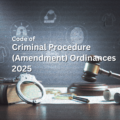The Evidence (Amendment) Bill, 2022 which was placed on the parliament on 31 August 2022 finally passed on 3 November 2022. The Evidence (Amendment) Act, 2022 has brought some substantial changes to the current Evidence Act, 1872. In this connection, Dhaka Law Review (DHLR) reached Mr Quazi Mahfujul Hoque Supan, Associate Professor at the Department of Law, University of Dhaka, with the following questions to know his insights on the effectiveness and possible consequences of the amendments brought.
DHLR: The amendment has broadened the definition of ‘Evidence’ to include physical or forensic evidence (all materials or objects relating to blood, semen, hair, DNA, finger impression, palm impression, iris impression, footprint, etc.) Moreover, the amendment opens the scope for the admission of digital records (records by/in computer memory, audio, video, DVD, CCTV footage, cell phone records, etc.) as evidence. Do you think we have enough technical facilities, trained professionals, and training facilities for utilizing the (criteria) of digital evidence properly?
Quazi Mahfujul Hoque Supan (QMHS): In my opinion, the Evidence (Amendment) Act, 2022 is not adequate to address the problems our country is facing. Our courts had been admitting digital evidence long before this amendment. In the Razu murder case (Sylhet Metropolitan Judge Court) the major evidence was a mobile video which was admitted as evidence through a wider interpretation of the definition of “Document” in the Evidence Act, 1872.
The newly passed amendment act has substantial similarity with the Indian Evidence Act. The amendment adopted in India to incorporate digital evidence has been raising complications. On the state level, recommendations were made to modify the Act. It created confusion regarding electronic records and digital evidence. The anomaly is severe as not every digital evidence is a “record’’. The same anomaly is visible in our Evidence (Amendment) Act, 2022. Digital record and electronic record as well as examples of types of evidence mentioned in the Act create confusion.
The Evidence (Amendment) Act, 2022 is based on the current technology. Any advancement and change in technology will require further amendment of definitions to include those changes. We can already see the decline of optical media, CDs, and DVDs. Even the new laptops we see don’t have the port to insert a DVD anymore. Technology has advanced so much that the examples provided in the definition of digital record/evidence fail to be inclusive. An inclusive definition of digital evidence would have been enough. We can look at the definition of evidence provided in the Evidence Act of Bhutan, 2005 which includes all types of evidence such as oral evidence, digital evidence, documentary evidence, physical evidence, and every other type of evidence that probably can arise in the future. What the Bangladeshi Evidence Act needed was a general inclusive definition which this amendment failed.
On several occasions, this amendment has referred to previous definitions of the ICT Act. For example, digital signature, and digital certificate is largely hypothetical as there has not been introduced in Bangladesh yet.
DHLR: Do you think we have enough technical facilities, trained professionals, and training facilities for utilizing the digital evidence properly?
QMHS: It cannot be said that there is no facility or expert. The forensic lab had been introduced in the CID branch of Bangladesh Police. But, the problem is, the experts we nourish are often transferred and thus their expertise cannot be utilized properly. In most of the Thanas in Bangladesh, there are no experts to tackle the issues of digital evidence. In Sagar-Runi murder case, it was claimed that the journalists destroyed the evidence whereas it was the duty of the State to protect the evidence. The Bishyajit murder case failed as the evidence could not be authenticated in court. The lack of technological knowledge results in such problematic situations.
There is no law that provides what should be mentioned in the post-mortem report or who should collect and protect the evidence. We are in a dire need of a law that will articulate the entire process of collecting physical evidence to address these undesirable situations. In the same manner, we need a well-articulated protocol regarding the collection and protection of digital evidence and authentication of the same in the court.
In Bangladesh, there are at least 13 laws that deal with digital evidence which have not been repealed on the passing of this amendment. It is undeniable that those provisions might create confusion for the court.
DHLR: Often these digital pieces of evidence are obtained unlawfully, e.g., by intercepting and recording phone conversations unlawfully, surveillance at people’s ordinary correspondence, etc., which violates the right to privacy. Should the Amendment Act have addressed this issue? If not, how can we tackle this problem in the coming days?
QMHS: These are mostly not collected unlawfully. We have a statute called the Bangladesh Telecommunication Act, 2001 where some new provisions were added and under this Act, law enforcement agencies can intercept calls. Any evidence collected in such a manner is admissible. It obviously conflicts with our right to privacy. This systematic bypassing of law has not been challenged yet in any court of law.
DHLR: Section 155(4), which allows showing in rape or an attempt to rape cases that the prosecutrix was of generally immoral character, has been repealed by the Amendment Act. Besides, the amended Section 146(3) puts a restriction that bad character or previous sexual behavior of the rape victim cannot be asked in cross-examination except with the permission of the court ‘for the ends of justice.’ But there are no fixed standards in the amended section as to when the court may permit questioning the character of the rape victim. Is there any other source to fix this standard?
QMHS: There is no fixed standard in the amendment regarding the idea of “ends of justice”. Section 155(4) has been repealed and there’s a restriction in section 146(3), but I think the situation won’t change for the victims. Even if the judges do not give permission, there is section 11 which provides that facts not otherwise relevant are relevant if they conflict with any fact in issue or relevant fact. In India, this section had been used to bring character evidence in the court. A negative provision forbidding the admissibility of character evidence could have solved the issue.
DHLR: Was there any such provision in the Act of 1872? If there was, what was the philosophy behind it?
QMHS: It was a colonial philosophy to subjugate women. In our subcontinent, women’s right to vote was ensured even before England. I think in Europe, women were subjugated far more. For instance, in France, a human civil right document was named “The Declaration of the Rights of Man and of the Citizen.” Such terminology expressly excluding women clearly shows the patriarchal ideology and tendency to oppress women. Through the colonial Act of 1872, we have inherited it in our laws.
DHLR: What would be the role of the court when the character of a rape victim who works as a sex worker is being questioned?
QMHS: Our society blames the sex workers whereas the men who are involved in such activities go without any reprimand. As mentioned before, the lack of negative provision in the matter of character evidence creates the scope of abusing law and leaves sex workers vulnerable to being questioned as to their character.
DHLR: In this regard, section 11 surfaces where it is stated that ‘facts otherwise not relevant are relevant’ and its application allows questions pertaining to character. Therefore, is it an option to repeal this particular provision?
QMHS: Yes, it is possible to repeal this Section. As I have mentioned earlier, Sections 5-55 should be repealed and a provision should be introduced where it will be expressed that “all evidence is relevant, except these …”. In that case, there will be no problem in repealing section 11.
DHLR: Sections 6 to 55 of the Evidence Act, 1872 deals with causal relevancy and you have said we should rather compile the facts that would be considered ‘not relevant’ in one section and declare that any other facts than these will be considered as ‘relevant’ facts. Do you think an opportunity has been missed while drafting this Amendment?
QMHS: Yes, it was a missed opportunity, because after 1973, this is the first amendment and none can claim with certainty when the next one will be made. This amendment demanded ample research but the desired quality of research is absent.
DHLR: Can it be said this amendment was largely influenced by populism?
QMHS: Not only populism, there was pressure from the international community as well. By enabling the provisions of digital evidence the drafters have opened the gate to accommodate the requirements of the international legal framework.
DHLR: As you said, the digital evidence has long been used by courts even without explicit mention in the evidence act, and the issue of character evidence has not been addressed adequately. But, do not you think the amendment will have some implications in the field of legal practice?
QMHS: In the last 10 years, judges have been acquainted with the idea of digital evidence but there was plenty of confusion among the prosecutors. Now as there is a definite set of legal provisions regarding the introduction of legal evidence, the air of confusion has been cleared to a great extent. The psychological uncertainty of the non-existence of laws has been dealt with.
DHLR: Do you think we were in a delay to bring these necessary amendments in the Evidence Act, 1872? How much of your expectation do the amendments fulfill?
QMHS: The 1872 Evidence Act had been drafted in haste and was problematic from its very inception. For example, there are no clear guidelines as to the qualifications of witnesses, and a proper definition is also missing. The Act was unplanned, and information is given in a very scattered manner.
I feel that the Evidence Amendment Bill has failed to meet our hope as no fundamental change has been introduced. Section 5-55 dealing with the relevancy of evidence is abundant as one single section could have been enacted to make all evidence relevant and the relevancy of some specific evidence could have been barred, for instance, character evidence.
There are several unnecessary connotations in some sections of the existing Act such as section 69 mentions “If a document has been executed in the United Kingdom, it must be proved that the attestation of one attesting witness at least is in his handwriting…” Since time has changed, England is no longer the only country Bangladesh deals with. Such ancient sections should have been changed to include all documents executed abroad.
Presently, a terrible situation arose in Bangladesh regarding confession. Even though the duties of judicial magistrates in this regard cannot be ignored, the existing provision regarding ‘shall presumption’ has some contribution to it. When a confession is given, the court presumes that the confession has been recorded following the required procedure. Such severe issues have been neglected in the amendment while digital evidence which has already been established in the court was valued too highly.
I doubt how much improvement can be made through amendments. It would have been better to draft a fresh Act. We could have benefitted from deserting the old, problematic Evidence Act and adopting a new Act meeting the contemporary needs of our justice system. On this point, I once again refer to Bhutan which has gone a long way by drafting provisions that suit them. We may follow their footsteps and stop blindly following the changes made by India.
The question of delay is immaterial because in my reckoning the amendments have not filled the basic gaps which have been existing in our Act. The amendments will hardly have any impact in making the Act progressive or effective. The scope was there to make really well-constructed amendments fulfilling the expectations and narrowing down the area of anomalies. It would have been a matter of pride if we were able to stamp the mark of our brilliance by constituting an Act incorporating the needs of our justice system.
DHLR: Thank you sir for your precious time and insightful opinions.
QMHS: Thank you.
















